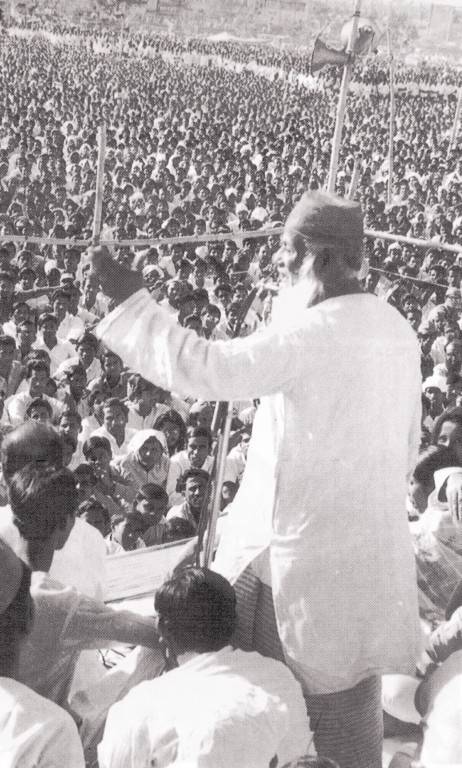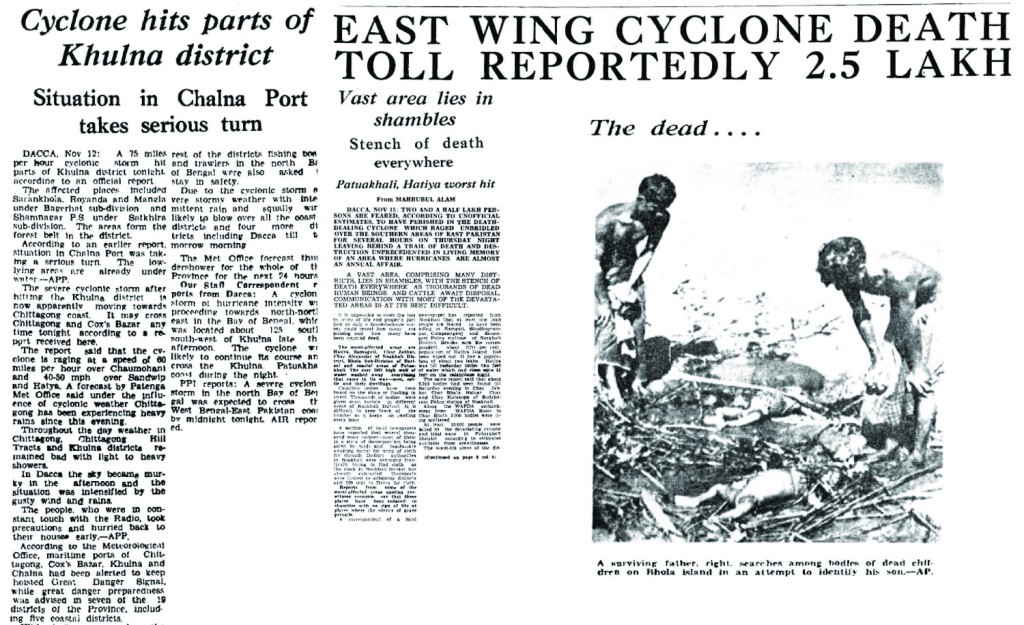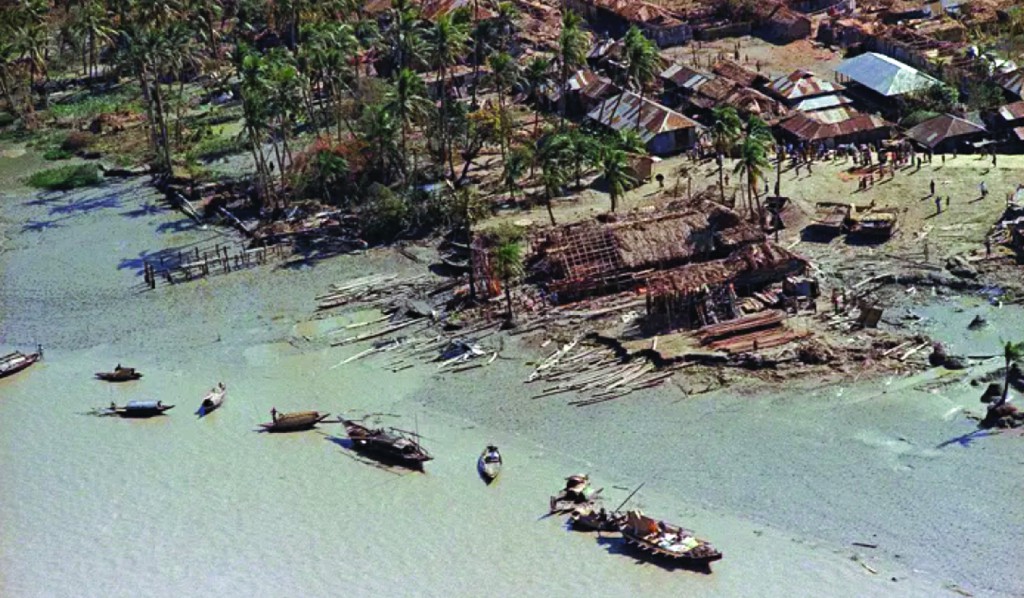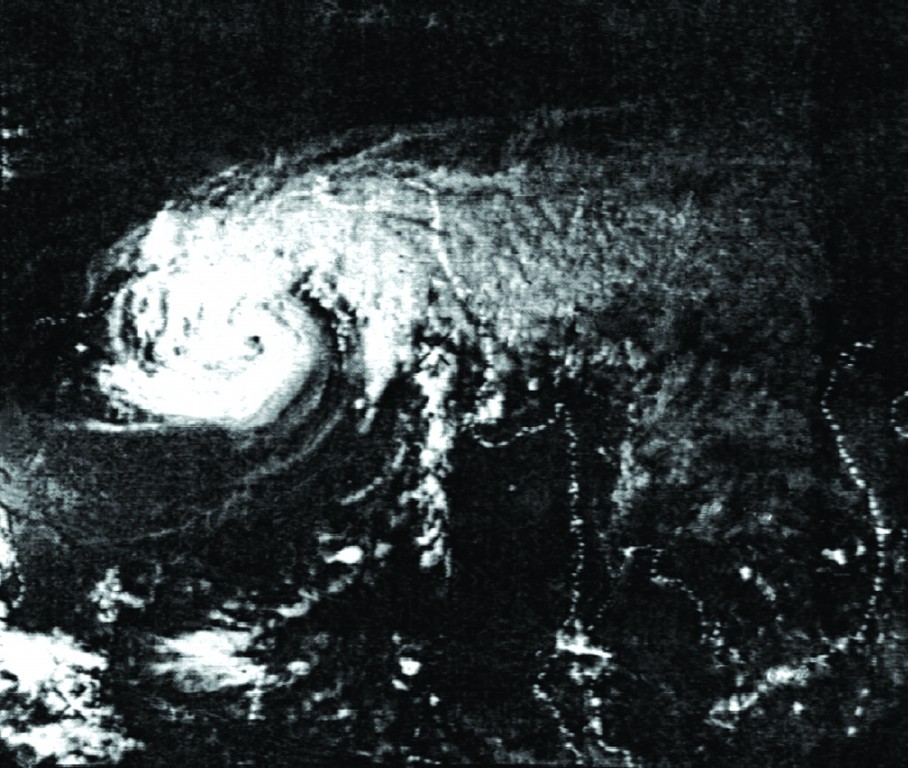
“Hook si dil mein uthi raat ke sannate mein
Aur phir dard ki lehron mein kaheen doob gai
Aasmaan jis pe fida tha voh zameen doob gayi”
(A sort of pain rose in the silence of the night
And then it sunk somewhere within the waves of pain
The earth to which the sky was devoted sank, never to rise again)
- Sailaab Ke Baad (After the Deluge) by Ghulam Muhammad Qasir
The 1970 Bhola cyclone was a devastating tropical cyclone that struck then-East Pakistan (present-day Bangladesh) and India’s West Bengal on November 11, 1970 – that is, 50 years ago last week. It remains the deadliest tropical cyclone ever recorded and one of the deadliest natural disasters. At least 500,000 people lost their lives, primarily as a result of the storm surge that flooded much of the low-lying islands of the Ganges Delta. This cyclone was the sixth cyclonic storm of the 1970 North Indian Ocean cyclone season, and also the season’s strongest.
The cyclone formed over the central Bay of Bengal on November 8, and traveled northward, intensifying as it did so. It reached its peak with winds of 185 km/h (115 mph) on November 10, and made landfall on the coast of then-East Pakistan (now Bangladesh) on the following afternoon. The storm surge devastated many of the offshore islands, wiping out villages and destroying crops throughout the region. In the most severely affected Upazila, Tazumuddin, over 45% of the population of 167,000 was killed by the storm.

The Pakistani government, led by a military junta under General Yahya Khan, was criticized for its delayed handling of the relief operations following the storm, both by local political leaders in East Pakistan and in the international media. During the election that took place a month later, the opposition Awami League gained a landslide victory in the province, and continuing unrest between East Pakistan and the central government triggered Bangladesh’s indpendence war. This conflict led to widespread atrocities and eventually concluded with the creation of the country of Bangladesh.
500,000, 1 million, 1.5 million – nothing can be said about the exact death toll of the cyclone with any certainty. The human mind is still incapable to imagine this cheapness of death and infinite destruction. In fact, the tragedy is unparalleled in history and its severity cannot be narrated in numbers. More than a dozen islands were wiped off the page of existence. The bastis of Noakhali lay desolate for miles, the corpses lay scattered unburied and unshrouded everywhere. Those who survived this tragedy were worse than the dead. They lay dying of starvation or epidemics, among the rotting corpses, without bread and butter.
The leader of the National Awami Party (NAP) Maulana Abdul Hamid Bhashani had said, on the basis of this very governmental disorder, in clear terms that the total responsibility for the loss of all these human lives fell on the government, which did not take necessary measures to save the people from the cyclone. His was a damning indictment
The history of human struggle against natural calamities is very ancient but today’s human is not just helpless before these calamities like ancient people were. As such, it was a legitimate question as to what had the government hitherto done for the protection of the coastal areas of East Pakistan.

The state of the government’s disorder in relation to the cyclone was that they failed to take measures to prevent loss of life: it so much so that this bloody series of accidents had been happening before our eyes for 22 years prior. People of the coastal areas were not warned of the danger of the cyclone in time. Pakistan Press International (PPI) had reported that due to the sudden termination of the traditional method of announcement of the danger signal from the Meteorological Department via Radio Pakistan, the people of coastal areas and coastal islands developed a serious misunderstanding and could not feel the severity of the danger through the prevalent warning system. The people had said that had they had an idea about the severity of the danger beforehand, such a great loss of life could have been avoided.
The leader of the National Awami Party (NAP) Maulana Abdul Hamid Bhashani had said, on the basis of this very governmental disorder, in clear terms that the total responsibility for the loss of all these human lives fell on the government, which did not take necessary measures to save the people from the cyclone. His was a damning indictment. There was a hope that the government would investigate this accusation to inform the people about its results and about future measures.

A loss of many billions of rupees and the termination of millions of human lives took place in the floods and cyclone in then-East Pakistan. It was not impossible to benefit from the measures for prevention of these calamities which had been adopted in other countries – especially given China’s experience. After all, China was and has always been Pakistan’s neighbour and best friend. But for that to have happened, Pakistan would have to feel the need for help on its own and accept this earthshaking and horrible destruction of millions of human lives directly as its own responsibility. At that moment, many were asking whether the government would limit its efforts just to relief activities and whether the objective was merely to number the corpses, and not to save human lives.
The President of Pakistan General Yahya Khan gave the nation the good news in a press conference that the central government had approved an expanded plan for long-term construction of the areas affected by the cyclone and for permanent settlement of their inhabitants. 86 crore (860 million) rupees would be expended on this project. He had also revealed that the project had been presented before the World Bank and its president had made a definite promise of aid. General Yahya Khan had also said that he was very seriously thinking of handing over this project to the army for putting into practice. He thought that “the army would accomplish this task with honesty and diligence.”
Regarding the accusations of negligence and meanness which were levelled at the central government around relief works, General Yahya Khan said, “I accept the objections. People have a right to object upon me.” But he also said that it was wrong to take political benefit out of this tragedy. He said he was satisfied with the relief arrangements being done at that moment.
(to be continued)
Raza Naeem is a Pakistani social scientist, book critic and award-winning translator and dramatic reader, currently based in Lahore, where he is also the president of the Progressive Writers Association. He can be reached at razanaeem@hotmail.com


